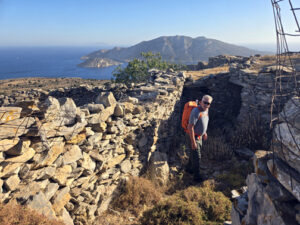
Photo provided by Steve GOLDSWORTHY
By Robin GOLDSWORTHY
Greece is known for historic architecture, delicious cuisine and world famous olive oil – and most recently a missing retired Los Angeles County sheriff’s deputy.
Albert Calibet, 59 of Hermosa Beach, went missing on June 11 while on a hike on the Greek island of Amorgos. The island was experiencing an extreme heat wave at the time with temperatures reported at over 100 degrees.
Among the volunteers who headed to the island of Amorgos was local volunteer Steve Goldsworthy (husband of CV Weekly publisher Robin Goldsworthy).
“We were asked by a member of Albert’s family to look for him,” said Goldsworthy. “We wanted to use our search and rescue expertise and also wanted to support Albert’s family.”
Goldsworthy, who is a member of the Montrose Search & Rescue team, made it clear that the trip was not department-related.
“This was a private search,” he said; the search had no affiliation with the sheriff’s department and the department didn’t sanction the venture.
“But when asked, we felt compelled to go,” he added. A benefactor paid for the trip and local resident Mike Leum coordinated efforts.
Goldsworthy traveled to Greece along with retired Los Angeles Sheriff’s Dept. sergeant and former MSAR coordinator Joe Larios, Calibet’s brother Oliver and Calibet’s girlfriend. The flight from Los Angeles International Airport to Athens took over 15 hours encompassing three different flights followed by an hour ferry ride to Amorgos.
From the start, Goldsworthy, who is the technology director for LASD- SAR teams, found limitations to what technology could be used in Greece to find Calibet. For example, strict privacy laws in Greece prevented access to cellphone records – something that Goldsworthy accesses regularly in the United States to find missing people. He said that if he had access to the records, he thinks that he could pinpoint Calibet’s location. Despite not having access to those records, though, he thinks the impact rescuers could have on the search wasn’t diminished.
“We utilized an interactive mapping system to track our assignments and where our folks were searching,” he said. “The Greek fire department was using drones. Plus we were able to have several important witness statements clarified, which narrowed down the exact time Calibet was last seen.”
Another limitation Goldsworthy found was the number of rescuers available to his team.
“We only had five or six people on the island out searching,” he said. He added the attitude of the Greeks, though, was “very helpful.”
“In addition to using drones to look for Calibet, the shepherds would keep their eyes open,” he said referencing the goat shepherds that were prevalent on the island. He added that police were as helpful as they could be but were limited to the information they could provide due to privacy laws.
The terrain of the island was very rocky.
“Sometimes we were just walking on rocks, not dirt like our trails here,” Goldsworthy said.
The island also contained rock structures that had been erected over hundreds of years, resulting in thousands of structures. Due to the high temperatures it was not inconceivable that a hiker would attempt to get out of the heat by ducking into one of these structures. Goldsworthy said that canines, in addition to drones, might be the best way to investigate the many rock structures. A canine team was brought in from Athens and was quickly dispatched.
Amorgos has no predators on the island; so Goldsworthy was hopeful that if Calibet succumbed to heat exhaustion he would find refuge in a rock structure. However, there are dangers associated with heat exhaustion.
“Initially, heat exhaustion can cause confusion,” Goldsworthy said. This brought into question whether Calibet, if suffering from heat exhaustion, would have the presence of mind to seek shelter or water. Or would he decide to try to return to his hotel?
“There are any number of possibilities that Calibet might have pursued if he was suffering from heat exhaustion,” Goldsworthy affirmed.
Calibet is just one of several people who are missing after setting off for a hike in extreme temperatures. Goldsworthy said eight people were missing at one point; three were later found deceased.
“These are people who chose to go hiking in adverse temperatures,” he said. “We always advise people as the temperatures rise, don’t go hiking.”
Goldsworthy returned to Los Angeles in the early morning hours of June 21. Another local of team of four replaced his team in Amorgos to continue the search.
Though happy being part of what he considers is a once-in-a-lifetime opportunity, Goldsworthy said he’s disappointed with the outcome.
“I’m happy I went,” he said, “but disappointed that we didn’t find Albert.”
